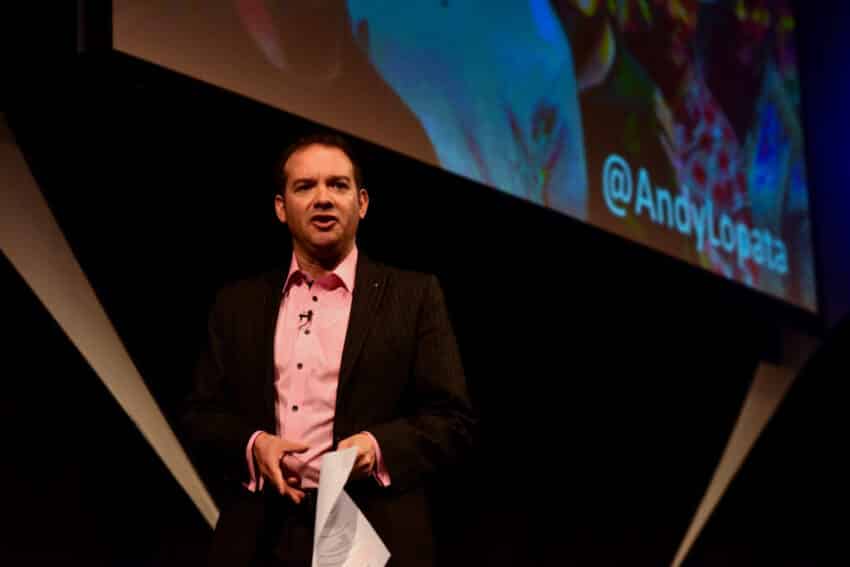A specialist in professional relationships and networking for over 20 years, we talk to Andy Lopata, who was called ‘One of Europe’s leading business networking strategists’ by the Financial Times.
What do you currently do?
I am an author, podcast host, speaker and mentor on professional relationships. That’s quite a mouthful, isn’t it?!
In short, I focus on how people in business can build, nurture and leverage professional relationships, whether for their career or as part of their role. In my book ‘Connected Leadership’ and ‘The Connected Leadership Podcast’ I look at how those relationships underpin executive success; while I work with a number of clients, either delivering presentations or in a mentoring capacity, on developing deep relationships and strong influence with key stakeholders.
My most recent book, ‘Just Ask’ focused on the role of those relationships in supporting us through challenging times, encouraging readers to surround themselves with people with whom they can be more open and vulnerable.
What was the inspiration behind your business?
It’s been a long journey; I first joined my father and his business partner running a business network back in 1999. While doing that, I recognised that we were creating the opportunity for our members to network with and refer to each other but not showing them how to go about it. So I developed a training programme that eventually focused predominantly on networking strategy rather than just the skills that most businesses typically focused their networking training on.
Having sold that business in 2007 and moved into working with multinational businesses, it was clear that the word ‘networking’ immediately led to negative preconceptions and restricted thinking. So I redefined my focus to ‘professional relationships’, as this resonates with a much wider group of people and allows me to focus on more than just exchanging elevator pitches and business cards over warm wine and cold canapes.
What defines your way of doing business?
The word that comes up time and time again is ‘authentic’. Like me or loathe me, I cannot wear a mask. I hope that I’m authentic in the way I engage with people and am honest in my interactions. I believe that I should be able to sleep comfortably after a day’s work, without worrying about how I have treated someone or about falling short of the standards I set myself.
That doesn’t always work in my favour but it does mean that my clients know what to expect from me and it allows me to build much more honest, transparent and genuine relationships with them.
Who do you admire?
When I ran the business network I remember how our members would run meetings differently and be on their best behaviour when I visited their group. Because I was the Managing Director of a business with groups across the UK and overseas, some members put me on a pedestal. I found that strange.
Here were people who, in many cases, had started their own businesses and were employing many staff putting me, who had joined his father’s business, on a pedestal.
I admire anyone who has taken the plunge and built a business from scratch. It takes courage and dedication to build a business and keep it running, particularly over the last two decades.
I also admire people who can be open, honest and vulnerable. Asking for help is one of the most important tools we have to overcome challenges and move forward but so many people struggle to do so, worried about how it will make them look.
Looking back, is there anything you would have done differently?
Of course!
Not on a ‘macro’ level – every step I have taken has led me to where I am now. And I wouldn’t change that for the world. But I have definitely learned a lot of lessons along the way and it would be foolish not to implement those lessons, given the chance.
The fundamental change is the platform on which each business (the network and then the speaking and mentoring business) is based. ‘Start with the end in mind’ is a phrase that springs to mind; if I was to start a new business today I would want to begin by getting the infrastructure right. What do I want the fully matured business to look like and what needs to be in place from the beginning to help support that growth?
It’s much harder to build that infrastructure when you are already tied up with running the business day-to-day.
What advice would you give to someone starting out?
My key advice would be the lesson I’ve just shared – know what you would like your business to look like when you want to sell it – whether or not you ultimately see yourself doing that. Put the basics in place as early as possible.
Beyond that, ask for help. Build and nurture a diverse and deep network of relationships with people who are in a position to help you and want to help you. Then be willing to leverage that network, enable them to help you by being clear about the support you are seeking and actually asking for it.


